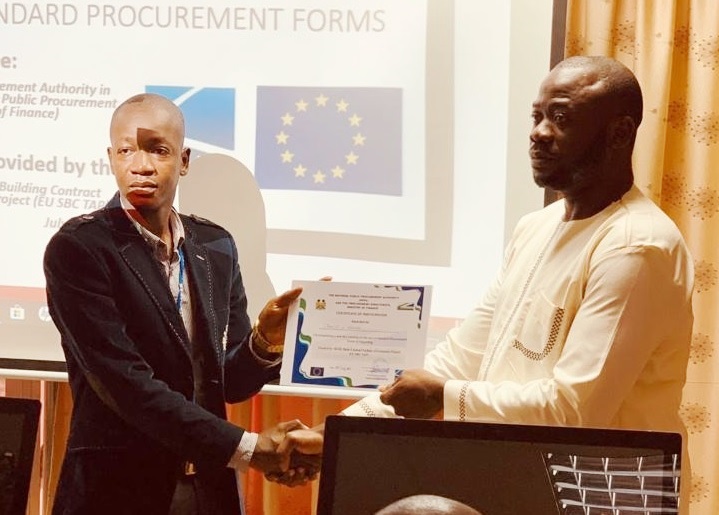By Ragan Conteh
The National Public Procurement Authority (NPPA) in collaboration with the Public Procurement Directorate Unit in the Ministry of Finance on Monday 29th July 2019 held a day’s Training workshop for 122 officials of Procurement Units in different Ministries, Departments and Agencies on Public Procurement Reporting Clinic through the use of Standard Procurement Forms.
The Public Procurement Reporting Clinic through the use of Standard Procurement Forms is funded by the European State Building Contract Technical Assistance Project (EU-SBC TAP).
In his statement, the National Public Procurement Authority (NPPA’s) Chief Executive Officer, Ibrahim Brima Swaray, disclosed that the role of NPPA is to monitor and regulate all procurement activities of Ministries, Departments and Agencies (MDAs) in the country.
He said the purpose of the form is to standardize the format of submissions to the Procurement Committee, to act as a checklist of information to be provided to the Committee and to ensure that submissions are presented with the approval of authorized responsible officers.
He continued that the form is a standard format for reporting and communicating decisions of the procurement authority for each procurement stage considered by the committee.
According to Ibrahim Brima Swaray, his institution with the mandate to monitor and regulate procurement units in MDAs in the country will soon begin to advise government to ensure proper data collection on procurement activities in the country, adding that over the years MDAs failed to provide adequate procurement data.
Ibrahim Brima Swaray stated that the forms must be submitted to NPPA either for information purposes or for verification reviews were deemed appreciation.
He said his institution will replicate the clinic to the entire nation to ensure career discipline, commitment and proper procurement data management on MDAs across the country.
The CEO intimated that the workshop is to train officials in different MDAs on proper record of data management that is geared towards enhancing transparency and accountability through the use of Standard Procurement Forms.
He admonished officials of MDAs to see the relevance of Procurement as a profession and as a clinical job, and advised participants to make their input into the form in other to enhance their capacity.
The Team Leader, European Union State Building Contract Technical Assistance Project based at the Ministry of Finance, Cyprian Kamaray, said it is important to understand what it is in the procurement unit and expressed satisfaction to NPPA for the capacity building of MDAs for effective and efficient use of procurement data management forms.
Cyprian Kamaray revealed that the Public Procurement Reporting Clinic through the use of Standard Procurement Forms is among the 25 million Euro funds provided by the EU to achieve certain targets in the National Public Procurement Authority.
He said, according to law, NPPA is responsible for the capacity building of procurement officials of MDAs and that the workshop will ensure the use of forms which will help to build the capacity of procurement officials in different sectors of government, as well as ensure proper and transparent procurement data management system in the country.
He admonished all participants to have some level of interaction so as to make their input into the on Public Procurement Reporting Clinic through the use of Standard Procurement Forms for transparency and accountability.
The Director of Procurement, Mohamed Musa in his statement, revealed that the mandate of the NPPA is to regulate and control procurement activities in MDAs, informing that the workshop is geared towards harmonizing the process of procurement activities and for officials of Procurement Units to have knowledge on proper procurement data records.
He said over the years they have experienced poor record management on procurement, adding that the Public Procurement Reporting Clinic through the use of Standard Procurement Forms will enable MDAs to have adequate knowledge on procurement and to track proper record system that will ensure transparency and accountability.
He continued that data collection should be based on empirical evidence and should not be on sampling, and assured participants of benefiting how to capture procurement forms which is very simple to operate so as to save the image of procurement.
He admonished participants to come with an open mind to discuss the relevance of the form as well as for effective and efficient management of procurement activities in their different institutions.
NPPA Trains 122 MDAs On Standardized Procurement Management


